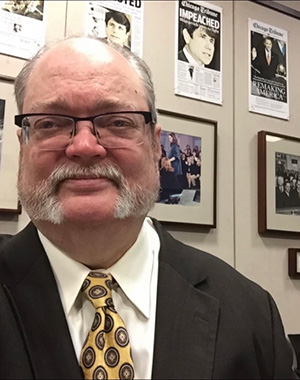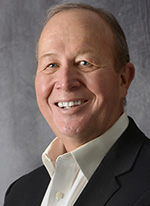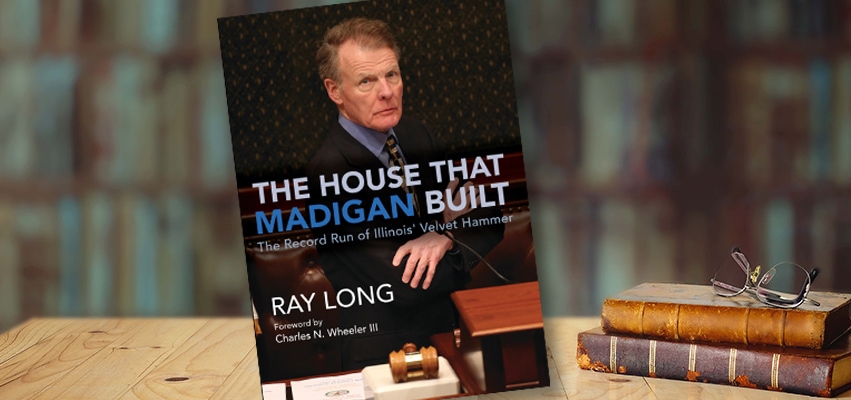
Peoria Magazine (PM): Your timing could hardly have been better for the publication of “The House That Madigan Built,” coinciding as it did with the indictment of the former Speaker. What prompted you to write this book, and what did you think you could add to the public’s understanding of one of the most exhaustively covered – and most polarizing – political figures in Illinois history?
Ray Long (RL): I wish I could take credit for the great timing, but I’m not clairvoyant. For years, I thought Michael Madigan would be worthy of a book because of his longtime impact and overarching reach. The University of Illinois Press reached out to me on June 11, 2018. Daniel Nasset, who is now editor-in-chief, asked for an even-handed biography about Madigan. As soon as I could clear it with my bosses, I said “yes.”
The timing just happened. In fact, I was disappointed the book didn’t come out before Thanksgiving (2021), but the pandemic and all of the accompanying supply chain problems pushed the publication date to March (2022), which turned out to come right around his indictment.
I didn’t want to do a biography packed with fluffy details, such as what cereal he ate for breakfast when he was growing up. I sought to pull together the big moments that shaped his legacy as a public figure, in a way that was readable, approachable and understandable to folks who may or may not have watched him over the years.
When I started, I expected he still would be the speaker when the book came out. Little did I know that I would be writing about his downfall — and exposing in my Chicago Tribune stories and chronicling in this book some of the shortcomings of his vaunted political organization along the way. I was among the reporters who documented a series of events that led to the end of his reign, ranging from the #MeToo scandals by misbehaving aides to the federal investigation that labeled him Public Official A and sparked a rank-and-file rebellion. It was a privilege to get the opportunity to pass along the observations of a reporter who covered what I still believe is the “Greatest Beat on Planet Earth,” where two governors went to prison, a state senator moved quickly to the White House, and the nation’s longest-serving House speaker fell from power.
PM: Mike Madigan avoided most press interviews, so I presume he did not cooperate with you in the writing of this book. How did that influence your approach? Were you able to speak with people close to him, or did they tighten ranks, as well?
RL: I asked for a Madigan interview and didn’t get it, but I had covered the General Assembly for over a quarter of a century full time and parachuted in to help out in almost every other year I wasn’t based in Springfield. I had plenty of quotes from him over the years from my reporting and that of others. Would it have been great to hear him answer questions? Absolutely. But I didn’t expect cooperation, especially when he was trying to salvage his speakership. I received cooperation from folks I will not identify because they don’t want to be identified.
PM: You have covered Madigan for more than four decades. How would you characterize your relationship with him?
RL: I had a professional relationship with Speaker Madigan. He had a spokesman, Steve Brown, who handled many of the day-to-day questions. The speaker sometimes took questions himself, sometimes not, depending on whether he wanted to say something. Those opportunities usually came after committee hearings, House sessions or budget summits. He occasionally held press conferences or provided written statements. A few of us got sit-down interviews over the years, but those opportunities became fewer over time. He could be approachable if you timed it right, but he mostly kept his thoughts to himself unless he saw taking questions from reporters as a necessity or helpful to his cause.
PM: Did you learn anything about him in your research that you did not know before, or that altered your understanding of him?
RL: There are many, many, many stories to tell about Michael Madigan. The hardest part of writing the book was deciding what to leave out. What I tried to do is offer key moments that give readers a chance to see a fuller picture of Madigan rather than how he has been caricatured as simply good or bad based on a person’s ideology or political party.
PM: Madigan always seemed like such an enigma to me. What made and makes him tick, in your view?
RL: Madigan wanted House Democrats to hold the majority, empowering him to control the process, decide the issues that passed and failed, and help the people who helped him.
PM: The lack of independence from some local legislators – their inability to break with the Speaker on some very significant issues — could be a source of great frustration in some corners of the voting public. How did one person manage to exert such control over his members and over the entire apparatus of state government?
RL: Michael Madigan learned how to control the levers of state government and the levers of politics. He knew how to make them work together to help enhance his power. He kept focused on how to keep the House majority and hold the speakership. Frequently outworking and outmaneuvering his political opponents, he knew how to win, and he did over and over.
Madigan capitalized on the notion that all legislation went through the House, and he had the influence, ability and power to decide what issues would succeed or suffocate. As chairman of the Democratic Party of Illinois, he raised campaign contributions at a phenomenal pace, and he decided which legislators’ campaigns would benefit from the largesse. He ran vaunted state and local political operations, including as the committeeman of the 13th Ward organization that was filled with immensely loyal precinct workers who often held government jobs that Madigan helped them get. Many of his top staffers rolled off of the state payroll and moved swiftly into lucrative lobbyist jobs, putting them in position to help the speaker politically and enjoy access to the most powerful politician in the state.
PM: You write that “knee-jerk Madigan haters will think that this book goes easy on him; Madigan lovers will think it hits him too hard.” Meanwhile, longtime Statehouse reporter and educator Charlie Wheeler wrote in his foreword that “bottom line, in my opinion, Madigan has been a positive force for the state of Illinois.” How would you assess the condition of the state of Illinois and state government now relative to 1983 when Madigan first became Speaker? How responsible is he for all of that?
RL: State government is in much worse fiscal shape, in my estimation, because the pension crisis looms over everything and remains unresolved. There is plenty of blame to go around because governors and lawmakers have shorted the pensions for decades. Madigan was part of that and has acknowledged that, but he has a lot of company in the state’s financial woes. He was speaker for 36 years, of course; his attempts to address the pension problem fell short.
Without saying it is good or bad, the state clearly has tilted to the left since Madigan took office, including the abolition of the death penalty, the implementation of gay marriage, an expansion of abortion rights, recreational marijuana and a greater reliance on gambling to pay bills. The electorate is restless and divided. This has spilled over into state politics, making it harder to reach non-partisan consensus on legislation and budgets.
PM: Ultimately, what do you hope readers take away from this book?
RL: Madigan was one of the most powerful political leaders this state has ever seen. He dominated legislative issues and politics and used each to buttress his grip on state politics and government. He became a major fundraiser, a prolific purveyor of patronage, a rainmaker for his property tax appeals firm, a leader of a fanatic army of followers, and a guy whose legacy as the nation’s longest-serving House speaker is threatened by the controversies that led to him being dethroned.
PM: Last question: Take us back to your days in Peoria at the Journal Star. How do you remember your time here?
RL: The days at the Journal Star could not have been better for me. The paper was robust with a circulation of close to 100,000 and a coverage area of 19 counties. I covered the 205-day UAW-Cat strike that paralyzed the city in 1982-83 and led to the downsizing of the company’s Peoria area workforce, the fatal botulism outbreak, the opening of the Civic Center, the band Genesis launching a nationwide tour in Peoria, the raucous fights between city and county officials, state and federal courts and politics.
I also worked as a full-time reporter covering a state government that passed a series of headline-grabbing bills that impacted Peoria, including legalization of riverboat gambling and off-track betting, the allocation of funds to help build the downtown baseball stadium and the day-to-day changes in laws that impact people’s lives.
It was a time when Republicans and Democrats could fight all day but find room for compromise. It was also a day when the Peoria paper had a full-time reporter in Springfield and the best legislative and political reporter in the state, Bill O’Connell. The paper actually gave us room to file as many as three full pages of legislative coverage virtually any day the General Assembly was in session, providing Peoria readers with the best and most comprehensive coverage of the statehouse of any paper in Illinois.
I learned a lot, and I always look back fondly at my days of living in Peoria and working for the Peoria Journal Star.





